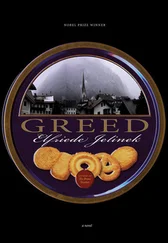I'm not tensed with anticipation any more and I have to get back to my place of work before they notice my absence.
Anna kisses Hans heartily. This makes a pretty loud smacking sound, which embarrasses Hans. He moves away from Anna and pulls on his work trousers and checked shirt. On the table are the second cheese sandwich and the bottle of beer you need to restore your energy. On the bed, the woman who will build you up even more. You have to love a man a lot if you'll let him eat a cheese sandwich beforehand. Anna loves Hans so much that she did not even notice the first cheese sandwich, just as a mother no longer notices her infant's shit.
Hans says he does not believe that that was Love, because Love is still ahead of him and looks more like Sophie and is Sophie. Long after his echoes have died away in the stairwell, Anna is still looking after him like a cow looking after an express train. She knows that Love looks like Hans, which is by no means an unattractive proposition but is still decidedly disagreeable. Because he has not realised what a gem she is and that she is the best woman he'll find, really she's too good for him in fact. Alas, he is in pursuit of faraway happiness, yet in reality happiness is so close. As close as the Good Things in Life are. But he must needs go a-roaming far away. Which is disagreeable for her. Though not for him.
SHAKEN BY THE wind, various trees tremble against the night sky. It looks as if they were being shaken by invisible iron clamps, but this scene of seeming disorder, which is in reality orderly, was created by a gardener, who put the trees together that way on purpose. They are creaking and squealing as if they were really for it now, but no one is doing anything to them, except the wind. After all, Sophie's garden affords them total protection from wanton damage by strangers. The impression they make is one of unconstraint and artistry, and that is precisely the impression Rainer wants to make too, crouched at the foot of a tree selected at random, maltreating the German language (as the German teacher puts it), though really his essays are of an unconventional type, slapping the rules in the face. Apart from his sister, the only person who understands this is Sophie, and no one else. He beats savagely at a blue spruce, repeatedly, because he cannot think of a certain word, it's on the tip of his tongue but it just won't come to him, but then, just as he's hitting the innocent spruce for the fifth time, suddenly there it is, the word is Death, of course, and it enfolds him in its gloom. He is forever having to think about death. He makes the appropriate face. In French, Death is a woman and appears in Cocteau; in German, Death is a man and appears in his own work. A poem is in the course of composition. Composition is a tormenting business and frequently goes unfinished because the poet gives up, discouraged. He has precious little patience for the business, because the making of a poem involves torment and unfortunately takes time, which the artist generally does not have because after all he has more to create than simply the one poem and has to be constantly roaring on ahead. Sophie does not roar like the wind, she glides like the blade of an ice-skate across a mirror of ice. This ground is her own ground, her own territory, and she needs no particular grounds to walk there, the ground is covered with an English-style lawn and sprinkled with pedigree flowers and water from a sprinkler. A white mirage materialises out of nothing and turns out to be she herself and (Rainer hopes) will not return to that nothing in too much of a hurry because he needs her for inspiration. He is stuck at the part where Death places the sailor's cap on the face of the dead child in the pond. This is reminiscent of Trakl, though only slightly. He tries being brutal, to conceal the tenderness he feels towards her, and orders her to sit down on her own lawn. This is something that she would normally say to him, usually the person who extends the invitation is the owner. But she sits down nonetheless.
A party is going on in the house, guests in gossamer dresses and brocade dresses and dinner suits making conversation. They are managerial people and they manage a great deal, as the word implies. Occasionally they can take a joke. What they manage is golf, or riding in the Krieau. The feeble sounds of a foxtrot can just about be made out, the women's pastel patches of colour glide to and fro to the music. Sometimes they flit, sometimes they shove and scoop like excavators and thrust everything aside, servants with trays flee for safety; if the servants are honest and hardworking their positions in this household will be permanent and secure. The dresses are wonderful and looking on is a treat, even if only from a distance, which is where Rainer is at present, he says he wouldn't go inside if you paid him, because if you're outside you have a better grasp of social structures, since you can see more of the overall picture. Structures of this kind have no place in literature, however, because they already exist and do not need to be invented, which is the exclusive task of poetry. The patches of colour lapped by the heads of their wearers surface like vast patches of colour (that is all they can be perceived as) from some crystal depth, jewellery glittering like the foam on waves. Rainer looks on, gaping, from his position, not of course in the street but in the grounds. Even that position is relatively unnatural, because this person is mostly to be found in interiors, carefully screened from the street and what goes on there. What Rainer's interested in is the raffish style of that girl's room of Sophie's, not the riff-raff in the streets. When I say girl I mean girl, because you are not a woman yet, Sophie, but it will be unbelievably more marvellous once you finally are one, once I've made you one. It will be an explosion, but without any of the fouling that usually goes on among human beings, alas, if the man is a jerk and the woman none too beautiful.
It has never occurred to Sophie that you can do anything else with bodies but sport, the thought has never entered her head, never struck her. There may be something apart from what I'm familiar with, something different, but what could it be? I can't for the life of me find out what it is, but it can't be necessary since I don't miss it, don't feel I'm going without something, so it won't be done, either. Although she often does do what is unnecessary. She has framed photos hung on the walls of her room: Sophie aged three, aged four, wearing beautiful tasteful dresses, on a private estate or outside one of those giant showcase hotels in St Moritz. The effect is terrifically aesthetic and she likes looking at those pictures since they emanate a certain harmony she has somehow lost, she doesn't know where, but she isn't looking for it because recently she has felt a slight need for dirt, which is the very opposite. Dirt in a grand style. Because everything Sophie does is stylish. Nothing by halves. Little piggy Rainer, by contrast, merely turns out paltry rubbish, which he then even proceeds to destroy by talking about it incessantly till every last scrap of muck has been transformed into gold, whereupon it can be slung out, garbage. Once it's gold it's no use to anyone. Why not wallow up to the hilt and deliberately forgo the transformation into literature? It is enough if you yourself know it's shit, does everyone else have to know too? Perhaps the act of describing muck means more to Rainer than the muck itself? How squalid.
Sophie's mother materialises, from out of a huge inherited fortune, in front of the huge iron gateway. Sophie's mother arises from out of the ground like a candle flame suddenly lighted, a crowd of people immediately fall upon her, scratching with their feeble claws at the portals of her capital, but they are given no reply, this crowd, and have to slink off with nothing accomplished. But she doesn't simply do nothing whatsoever, this mother, as you might expect, she is also a first-rate scientist and extremely beautiful, she gets her fulfilment out of the things she does, some people do more and others do less, she emphatically does more. Merely being at home isn't enough, you have to be a scientist too. It is like a picture by Klimt being pulled along by an express train, out of the darkness into the light. Her pale blue silhouette is by no means conceived as a memorial to all those who kicked the bucket in her very own steelworks in the Nazi period, it is intended as a beautiful sight for unprejudiced eyes; even if you have reservations, you still have to recognise beauty as such when you come across it, irrespective of the person. She tells Sophie to go indoors so that she does not catch cold, in any case some guests want to see her. Your friend can help himself to some of the homemade raspberry ice cream in the kitchen, it doesn't matter if he stuffs himself, there's plenty. You can't buy my love, Mama. Promptly Mummy goes indoors, hissing, flings herself on the bed and succumbs to a fit of hysterics, screaming like an animal in its death throes, sundry people are unable to calm her down and a professor of medicine who is present accordingly gives her a sedative. She couldn't care less about her guests, she'll kill herself here and now if her one and only daughter doesn't love her. Her husband is spat at and thrown out when he asks how she is, he comes from a relatively poor family and took a course in mechanical engineering, which involved his parents making considerable sacrifices. But those sacrifices have been forgotten, so have the parents, only the sobbing wife is still there.
Читать дальше












